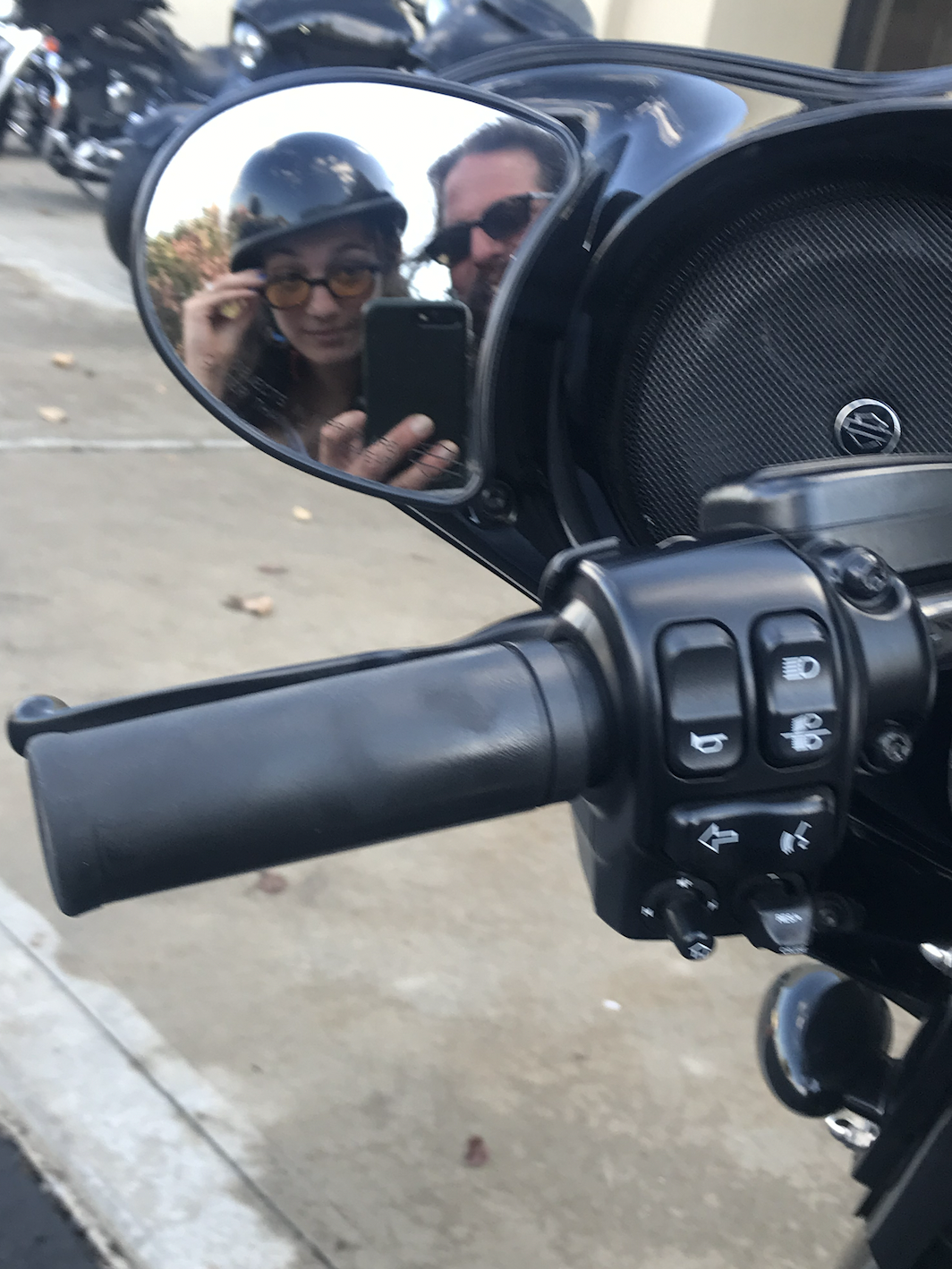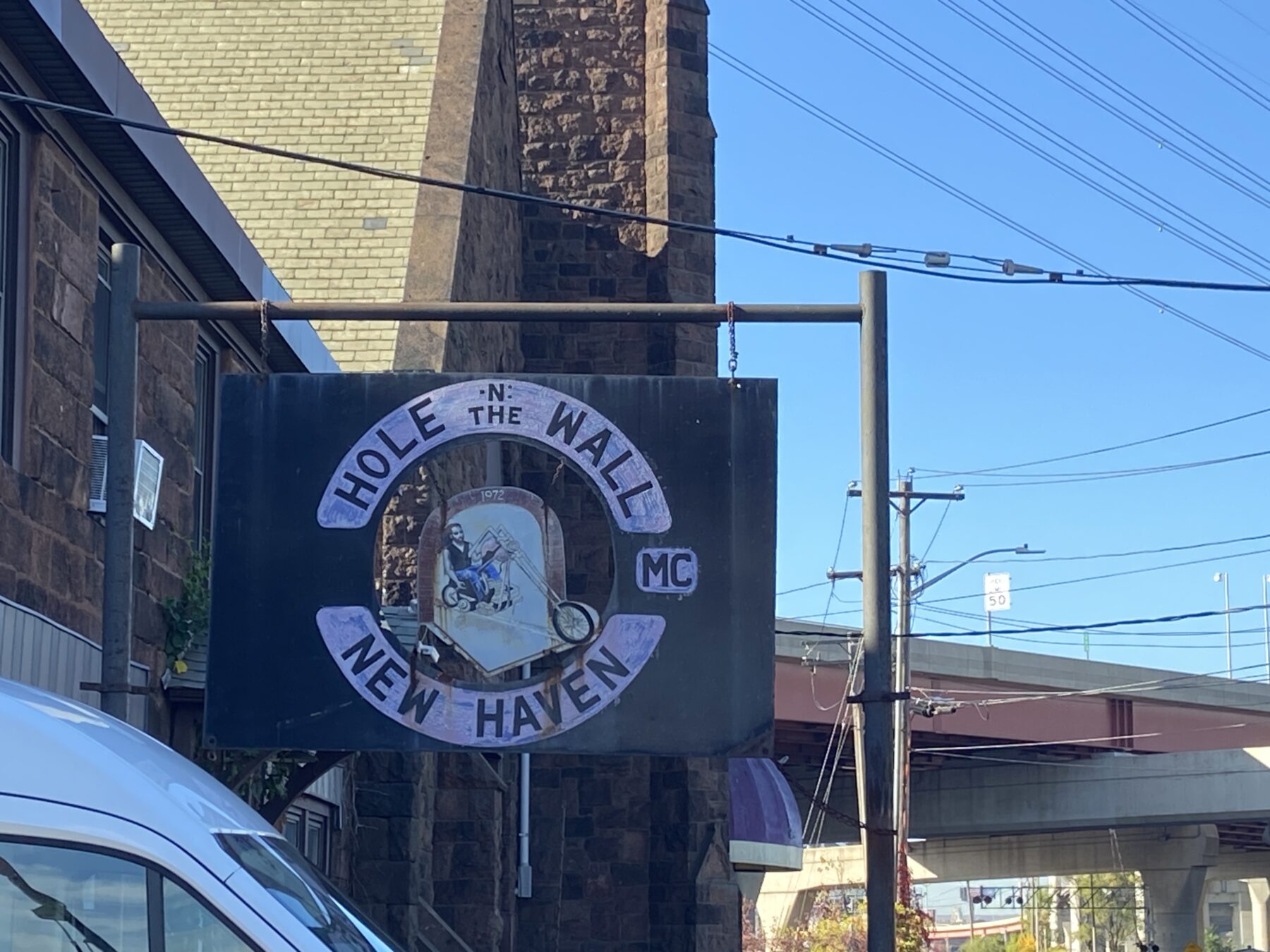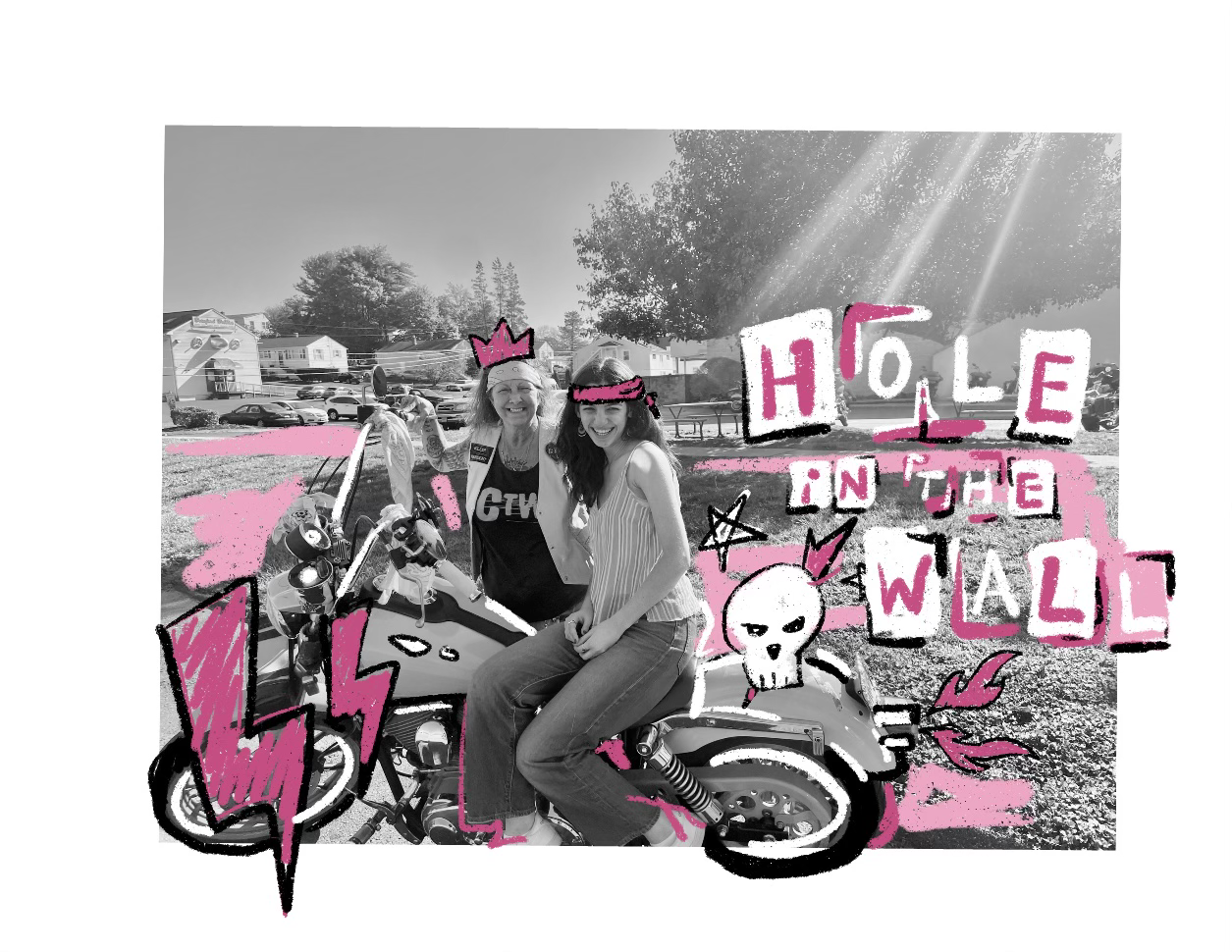Debi Killer talks me through her trauma like it’s a grocery list.
Abusive household. Alcoholic father. Foster system at 11. Near-fatal car accident at 16. Breast cancer. Stroke and complete paralysis at 52. Milk. Eggs. No four-leaf clovers. But Killer doesn’t see herself as unlucky.

“I’ve had a lot of miracles in my life,” she remarks with the throaty voice of a sure smoker. There’s nothing divine about her endurance, though. She’s just tough. “Killer” is a name her friends gave the gritty 11-year-old Debi to help her remain unidentified when she ran away from home. At 62, the faint haunt in her eyes tells you she’s had to be as cutthroat as the title.
And yet, those eyes are the last thing you notice about Killer. They’re shielded by her head-to-toe baby-pink outfit. Her glasses, bandana, vest, biking gloves, sneakers, and lipstick all match so closely that you’d think she dyed them herself. They also match the bright pink ’78 Shovelhead motorcycle that she’s been riding for over forty years––and still rides after making a complete recovery from her stroke.
“Because my past was so hard and so rough, this is my escape,” she says of riding motorcycles. “A lot of people bike for that freedom, that relief of trauma that they dealt with in life.”
Killer is the president of Connecticut Women Motorcycle Club Nomads, a female motorcycle group that also holds events to advocate for breast cancer awareness. She has seen the number of female bikers riding in Connecticut grow exponentially during her lifetime. She founded the group in 1987 with twelve “sisters.” Today, forty-five women ride with the Club.
Killer is full of laughter and quick with aphorisms. She doesn’t project ferocity. She explains that it’s because she, along with most of those she’s ridden with throughout her life, values respect above all else: “It’s brotherhood, sisterhood, we’re tight-knit. If someone’s broken down on the side of the road, I don’t care if I know them or not, I’m pulling over.”
Biking is all about the community, I’m told over and over by bikers across the city. Being a biker doesn’t mean just owning a bike—it’s when you bike with others that you truly become a biker.

Jordan Voss, a 40-year-old biker from West Haven, put it simply: “Biking alone is like having a party by yourself.” It’s an oxymoron.
Like many bikers I spoke to, Voss feels close to the biker community despite being unaffiliated with a particular group. Five bikers told me that it’s normal to ride with different groups on different days, joining larger crowds to attend biking events in far-flung cities. According to Killer, there are too many biking groups to count, and various groups handle membership differently. She accepts new riders based on a vote of current members along the criteria of “no lies, no drugs, no trouble, and no negativity.”
I sit with Voss on cushy leather couches in the back of the Owl Shop cigar lounge. He smokes Blondie cigars and sips bourbon, trading flirty insults with the waitress as she comes by. He turns the conversation in unexpected directions, first toward the Israel-Hamas war, then to DeSantis versus Trump. Then, in an effort to find some point of connection between us, Voss draws a metaphor. Biking is like being an overseas journalist, he says. “You’re so motivated to become part of that industry that you’d put yourself in danger.”
Court charges and broken limbs are the price some bikers pay to claim the identity and image they romanticize—free, cool, part of something.
Biking is, indeed, an industry: Cue Gabriel Canestri Jr. and Salvatore Fusco, two bikers based out of New Haven who have turned the activity into a business and a source of fame. Both men have hundreds of thousands of followers on Instagram and post videos that regularly garner millions of views. The rapper Drake follows Canestri, and 19.2 million people have viewed a video the biker posted of himself riding a completely vertical bike inside the clubhouse where he and Fusco work.
“EVERYTHING WILL KILL YOU. CHOOSE SOMETHING FUN.”
The words loom over the Hole in the Wall clubhouse, better known to bikers as “The Shop.” Tucked behind an abandoned church, The Shop is home to the New Haven-based motorcycle merchandise and hard parts brand Eastcoastin Crew. The large, open-air garage is filled with gleaming Harley-Davidsons. The walls are plastered with stickers and spray-painted tags boasting slogans so stereotypical they come across as ironic.
Canestri and Fusco, co-owners of Eastcoastin, run up and down the clubhouse ramp, wide enough only for a single wheel. They tend to the bikes with purpose and urgency, halting their constant motion only to noogie the shop dogs. Fusco coaxes the handlebar of a bike with precise twists of his fingers, his hands black with grease.
When Canestri and Fusco started Eastcoastin in 2017, it revolutionized the New Haven bike scene. They were among the first people to attempt advanced stunts on Harley-Davidsons, which are larger and heavier than other motorcycles. The average motorcycle weighs about 430 pounds; most Harleys weigh between 540 and 905 pounds. On these bikes, the men attempt tricks such as stoppies, lifting the back wheel up to meet the ground with their eyes, and wheelies, hoisting the front wheel to hang, suspended horizontally, off the back of the bike. Canestri and Fusco’s gravity-defying, eye-widening tricks carved out a name for New Haven in the biking world, drawing many more bikers to the area and more of those already in the area to biking.
“They do tricks and controlled slides in very close proximity to each other,” marveled Mario Galasso, co-owner of the Freedom Road Harley-Davidson dealership in Branford. “When they’re doing their shows, it’s like an orchestrated ballet.”
Canestri and Fusco declined to speak on the record about biking, citing concerns about an ongoing lawsuit brought against them by the city of New Haven. In 2022, Mayor Justin Elicker’s administration sued five defendants affiliated with Eastcoastin over a party and stunt show the business hosted in 2021. The City claims that the event broke a Connecticut law requiring event organizers to cover the cost of police protection in any “place of public amusement.” The lawsuit separately alleges that the defendants violated the Connecticut Unfair Trade Practices Act, which “prohibits unfair competition and unfair deceptive acts,” arguing that it is unfair for Eastcoastin to have profited from the event while the City incurred the costs of public protection. Underpinning the ongoing legal dispute is a fundamental divergence of opinion between Eastcoastin and the City about whether biking should be tolerated in public spaces.

Elicker recently launched a joint regional task force with several municipalities neighboring New Haven. It’s part of a yearslong effort to combat illegal riding in Connecticut of dirt bikes, which have two wheels and are intended for off-road driving, and all-terrain vehicles, which have four wheels and are meant for off-highway use. In a press conference, the mayor said that New Haven has seized thirty-three dirt bikes and ATVs so far this year.
Elicker told me that there is a difference between street-legal bikers and dirt and ATV bikers. Street-legal bikers simply break minor traffic laws, while the dirt and ATV bikers “do street takeovers” and are “somewhat regularly” found with guns when they are arrested for biking. Although Eastcoastin uses street-legal bikes with brakes, headlights, and other safety equipment, Elicker said that he is concerned about similar “street takeover” issues when they gather bikers who upset traffic patterns, riding through the city en masse.
“In that circumstance, it’s somewhat similar,” he said, referring to the 2021 event at the center of the lawsuit. “Thousands of people came either as spectators or riders and completely took over the streets.”
Eight of the bikers I talked to told me the same thing about dirt and ATV bikers. They’re kids. They’re hooligans. It’s okay, though—let them live. There’s no tension between them and the Harley riders, even if there’s tension between them and the law.
The dirt and ATV bikers, according to Voss, are often just 15 or 16 years old, and “cause chaos throughout the city, break windows on cars, and steal bikes. But there’s no tension because the groups just don’t associate.”
Killer agreed. In fact, she’s “been in the pack a few times,” she said, referring to the younger, more reckless crowd. This is a common theme among motorcyclists who have had long riding careers. It’s customary to fall in with the daredevils as a young rider before graduating to more sanctioned riding styles and bikes. When the older bikers I spoke to stop at red lights, they are left with nostalgia for their more reckless days. Connection, not just danger, characterizes the rides of younger bikers.
“Everyone’s together, everyone wants to join in,” Killer said, frying her vocal chords for emphasis on toGEther. “Why not? We all just want to be left alone and be free.”
Dave Molster-Pecoraro, a 51-year-old biker from East Haven unaffiliated with a biker group, credits biking’s unifying power for reuniting him with his biological father. A few years ago, Molster-Pecoraro identified his father through Ancestry.com. They decided to meet and bonded over their shared love of bikes. A few hours after their conversation, he checked his phone to learn he had won a Harley-Davidson in a raffle. He and his father now take a weekly ride together on Sundays. “It’s like we were never apart,” he said.
A cheerful Molster-Pecoraro cranks up “Hellraiser” by Ozzy Osbourne on the speaker of his Harley. He’s offered me a ride. I hold on to the skull tattoo on his upper left shoulder for dear life, and without GPS or a watch, we set off through East Haven. He salutes each passing biker with the “biker wave,” extending his middle and pointer fingers downward and curling the rest together. His sharp, staccato “ha-ha-ha” cuts the wind.
When we pull into a parking lot, he tells me it’s impossible to explain in words why biking bonds people together so well. It’s a feeling you only understand when you’re riding. Once you’re on that bike, suddenly, you’re sharing an experience with every other biker you pass.
Galasso, co-owner of the Branford Harley-Davidson dealership, told me that bikers welcome anyone who believes in the freedom philosophy of riding regardless of age, background, race, or gender. Killer contended that outside of the speckless Harley dealership, it’s more complicated. She and other women have had to work hard to carve out space for themselves in the biking world, which is male both in constitution and in temper.
When it comes to intergroup attitudes, motorcyclists, dirt bikers, business owners, and joy riders set their different styles aside. They coexist, bonded by their common passion and mutual value of freedom from judgment. Tough childhoods are understood, even assumed. If you’re in, the acceptance is radical.
And to be in, you just have to understand that the thrill comes when the rules go. The wind belongs to everyone. A guaranteed equalizer.
“That’s why I brought you for a ride,” Molster-Pecoraro smiles. “I wanted you to experience it.”
My hair has ballooned into a fluffy, wind-blown tangle. I feel included.
-Josie Reich is a sophomore in Davenport College.
Photography by Josie Reich. Illustrations by Sarah Feng.

